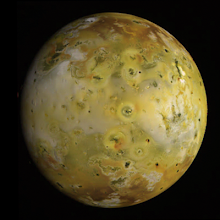Press Release: Organic Materials Spotted High Above Titan's Surface
JPL has a press release up on their site from the INMS team regarding the data returned from the instrument for April 16's T5 flyby. This data was covered on Friday.
From the Press Release:
From the Press Release:
Scientists believe that Titan's atmosphere may be a laboratory for studying the organic chemistry that preceded life and provided the building blocks for life on Earth. The role of the upper atmosphere in this organic "factory" of hydrocarbons is very intriguing to scientists, especially given the large number of different hydrocarbons detected by Cassini during the flyby.While, the discovery of complex hydrocarbons on Titan is no surprise, finding them so high up in Titan's ionosphere is puzzling. How such massive molecules reach such altitudes will surely be an important topic for this INMS team for some time to come.
Cassini's ion and neutral mass spectrometer detects charged and neutral particles in the atmosphere. It provides scientists with valuable information from which to infer the structure, dynamics and history of Titan's atmosphere. Complex mixtures of hydrocarbons and carbon- nitrogen compounds were seen throughout the range of masses measured by the Cassini ion and neutral mass spectrometer instrument. "We are beginning to appreciate the role of the upper atmosphere in the complex carbon cycle that occurs on Titan," said Dr. Hunter Waite, principal investigator of the Cassini ion and neutral mass spectrometer and professor at the University of Michigan, Ann Arbor. "Ultimately, this information from the Saturn system will help us determine the origins of organic matter within the entire solar system."
Hydrocarbons containing as many as seven carbon atoms were observed, as well as nitrogen- containing hydrocarbons (nitriles). Titan's atmosphere is composed primarily of nitrogen, followed by methane, the simplest hydrocarbon. The nitrogen and methane are expected to form complex hydrocarbons in a process induced by sunlight or energetic particles from Saturn's magnetosphere. However, it is surprising to find the plethora of complex hydrocarbon molecules in the upper reaches of the atmosphere. Titan is very cold, and complex hydrocarbons would be expected to condense and rain down to the surface.
"Biology on Earth is the primary source of organic production we are familiar with, but the key question is: what is the ultimate source of the organics in the solar system?" added Waite.
Interstellar clouds produce abundant quantities of organics, which are best viewed as the dust and grains incorporated in comets. This material may have been the source of early organic compounds on Earth from which life formed. Atmospheres of planets and their satellites in the outer solar system, while containing methane and molecular nitrogen, are largely devoid of oxygen. In this non-oxidizing environment under the action of ultraviolet light from the Sun or energetic particle radiation (from Saturn's magnetosphere in this case), these atmospheres can also produce large quantities of organics, and Titan is the prime example in our solar system. This same process is a possible pathway for formation of complex hydrocarbons on early Earth.


1 Comments:
The rate of accumulation of the organics on Titan's surface is *very* slow, especially when compared to the likely rate at which methane rainfall occurs. I'd guess the rain washes the organics into the lowlands, along with water-ice sand created by erosion, and thus buries the organics. But maybe all you need to get to those organics is a shovel.
Chemosynthetic exothermic bugs on Titan would be awfully cool (or warm, as the case may be), but if there's life on Titan I'd guess it's way down in the mantle. I suppose a long-lived volcanic vent might bring the stuff up and keep it warm enough to thrive on the surface; if deep-sea vents on Earth can create ecosystems that die out when the vents do, the same could happen on Titan.
Jason - is there any chance that Cassini could spot molten cryolava? Would it be hot enough, or disturb the atmosphere enough, to be detectable?
Post a Comment
<< Home